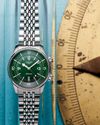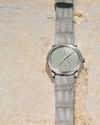Over 150 years after its founding, Zenith continues to preserve the principles laid out by its founder when he set out to create a vertically-integrated manufacture.

Integrated mass production is probably most closely associated with Henry Ford. Ford’s Model T revolutionised the automobile industry; each car spent just 93 minutes on the assembly line, and the integrated manufacturing process drove down costs to make it the first affordable car for the masses. In much the same way, watchmaking had a similar giant in Georges Favre-Jacot, who created one of the industry’s first vertically integrated manufactures – long before the concept was formally defined, much less appreciated for its advantages in costs and quality control.
Favre-Jacot’s approach was startlingly holistic, and went against the zeitgeist. At the age of 22, he began building the manufacture in Le Locle, a little city nestled in the Jura Mountains, and grew it over the years into a group of 18 buildings, all situated on a single plot of land. Together, these facilities were capable of all manufacturing activities, beginning with case production in the foundry and mills, to movement production and assembly, to specialised crafts such as dial making. This was unusual to say the least; the common practice at the time was to source for the best components one could get from external suppliers, and confine some production and assembly in-house. Favre- Jacot didn’t just internalise his production – he even built accommodations in two parts of Le Locle to cater to his employees, including a boarding house for single workers, and saw to their welfare with health insurance and even a pension fund.
This story is from the {{IssueName}} edition of {{MagazineName}}.
Start your 7-day Magzter GOLD free trial to access thousands of curated premium stories, and 9,000+ magazines and newspapers.
Already a subscriber ? Sign In
This story is from the {{IssueName}} edition of {{MagazineName}}.
Start your 7-day Magzter GOLD free trial to access thousands of curated premium stories, and 9,000+ magazines and newspapers.
Already a subscriber? Sign In

BUOYANT HEAVYWEIGHTS
The ubiquitous use of titanium and carbon fibre does not satisfy a growing number of watch lovers; the indisputable rise of quiet design vexes them. The recent release of hefty and heavy timepieces, especially in the dive watch segment, proves that some just like it big

YEN FOR PRECISION
While we typically think of watchmaking as a Swiss matter, this ignores the powerful contributions of Japanese industry and know-how. We begin this deep dive with a look at the biggest names in the game

LEGENDARY DEPTHS
From pioneering chronographs to revolutionizing dive watches, Longines has always been at the forefront of horological advancements. Explore how the Swiss brand's journey through water-resistance shaped the future of dive watches-and made a splash in the process

LEAPING AHEAD
IWC updates the perpetual calendars in its Portugieser range with four new models

HOLDING THE HIGH GROUND
Chanel's 2024 collection represents a rare moment where haute couture and haute horlogerie coexist perfectly

SARTORIAL TIMING
Parmigiani Fleurier encourages us to take a second, and perhaps third, look at the new Toric collection of watches

LEFT HAND DRIVE
The DOXA SUB 300T Aristera is a tribute to the brand's heritage in dive watches, combining the original design with a left-handed twist for 2024, offering the standout features that made DOXA renowned while breaking new ground in functionality

LIVING HISTORY
A. Lange & Söhne has spent the better part of this year celebrating the 25th anniversary of the seminal Datograph. With the Datograph Handwerkskunst, the watch is elevated to the highest level

THE PURSUIT OF PERFECTION
Since its inception, Rolex has never wavered in its pledge to create the world's finest watches for anyone, anywhere

SWEET SPOT
The Longines Legend Diver is just the right amount of watch for a contemporary sports model that could also pull dress watch duties